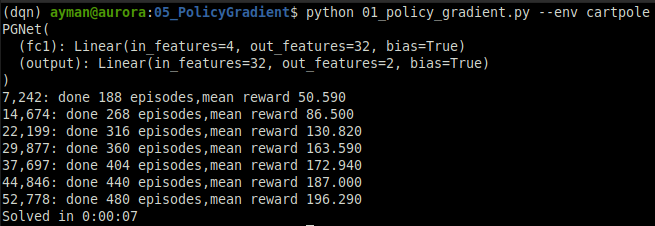Unfortunately the GRU (or LSTM) layer model is not learning! I’ve tried many combinations and feeding techniques, but it didn’t learn at all 
However, when I replace GRU layer with a GRUCell, the model works fine and solves the environment (in 6 seconds)
** My question is: what’s the difference between GRUCell and GRU Layer? And why this is happening?
=====================================================
Here’s the logic I’m using:
Reinforce algorithm:
1 - initiate the model using random weights
2 - play N full episodes gathering (state, action, reward)
3- for each episode: calculate the discounted rewards for subsequent steps:
𝑄(𝑘,𝑡) = ∑ 𝛾^𝑖 * 𝑟𝑖
4- Calculate the loss function and add entropy to improve exploration:
ℒ = − ∑ 𝑄(𝑘,𝑡) log (𝜋(𝑠(𝑘,𝑡) , 𝑎(𝑘,𝑡)))
5- perform SGD update of weights, minimizing loss
6- repeat until solved
When GRU layer:
a. hn = None at the beginning of each episode t=0
b. hn from t-1 is then fed to the network at step t
=========================================================
Here’s the code. To run it as a GRUCell mode just add --cell argument
#!/usr/bin/env python3
# -*- coding: utf-8 -*-
"""
Created on Sat Jun 26 14:39:33 2021
@author: Ayman Al Jabri
"""
import gym
import torch
import torch.nn as nn
import torch.nn.functional as F
import argparse
import numpy as np
from time import time
from collections import namedtuple
from itertools import count
from datetime import datetime, timedelta
Experience = namedtuple('Experience',['state','action','reward'])
class GRULayer(nn.Module):
r"""GRU plain vanila policy gradient model."""
def __init__(self, obs_size, act_size, hid_size=128, num_layers=2):
super().__init__()
self.hid_size = hid_size
self.num_layers = num_layers
self.input = nn.Linear(obs_size, 32)
self.gru = nn.GRU(32, hid_size, num_layers, batch_first=True)
self.output = nn.Linear(hid_size, act_size)
def forward(self, x, hx=None):
r"""Return output and pad the input if observation is less than sequence."""
batch_size = x.size(0)
y = self.input(x)
y = y.view(batch_size, 1, -1)
if hx is None:
hx = torch.zeros((self.num_layers, x.size(0), self.hid_size))
y, hx = self.gru(y, hx)
else:
y, hx = self.gru(y, hx)
y = self.output(F.relu(y.flatten(1)))
return y, hx
class GRUCell(nn.Module):
r"""Plain vanilla policy gradient network."""
def __init__(self, obs_size, act_size, hid_size=128):
super().__init__()
self.fc1 = nn.GRUCell(obs_size, hid_size)
self.output = nn.Linear(hid_size, act_size, bias=True)
def forward(self, x):
"""Feed forward."""
y = F.relu(self.fc1(x))
return self.output(y)
def discount_rewards(rewards, gamma):
r"""
Summary: calculate the discounted future rewards.
Takes in list of rewards and discount rate
Returns the accumlated future values of these rewards
Example:
>>> r = [1,1,1,1,1,1]
>>> gamma = 0.9
>>> [4.68559, 4.0951, 3.439, 2.71, 1.9, 1.0]
"""
sum_r = 0.0
res = []
for r in reversed(rewards):
sum_r *= gamma
sum_r += r
res.append(sum_r)
return list(reversed(res))
@torch.no_grad()
def generate_eipsodes(env, gamma, cell, n=3):
r"""Yield n number of episodes' observations:(state,action,discounted_rewards,total_rewards,frames)"""
episode = 0
batch_total_rewards = 0
hc = None
act_size = env.action_space.n
states,actions,rewards = [],[],[]
dis_r = []
state = env.reset()
for frame in count():
state_v = torch.FloatTensor([state])
# if np.random.random() > 0.5: # placeholder to injects noise
# state_v.fill_(0.0)
# pass
if cell:
prob = net(state_v) ##Linear
else:
prob, hc = net(state_v, hc) ##GRU
prob = torch.softmax(prob,dim=1).data.cpu().numpy()[0]
action = np.random.choice(act_size, p=prob)
last_state, reward, done, _ = env.step(action)
states.append(state)
actions.append(action)
rewards.append(reward)
if done:
dis_r.extend(discount_rewards(rewards, gamma))
batch_total_rewards += sum(rewards)
rewards.clear()
episode += 1
state=env.reset()
hc = None
if episode ==n:
yield (np.array(states,copy=False),
np.array(actions),
np.array(dis_r),
batch_total_rewards/n,
frame)
states.clear()
actions.clear()
rewards.clear()
dis_r.clear()
batch_total_rewards = 0
episode = 0
state = last_state
if __name__ == '__main__':
parser = argparse.ArgumentParser()
parser.add_argument('--cell', action='store_true', help='Use GRUCell instead of GRU layer')
args = parser.parse_args()
ENTROPY_BETA = 0.02
GAMMA = 0.99
HID_SIZE = 64
NUM_LAYERS = 2
SOLVE = 195
LR = 0.01
N_EPS = 1
SEED = 155
env = gym.make('CartPole-v0')
env.seed(SEED)
torch.manual_seed(SEED)
np.random.seed(SEED)
obs_size = env.observation_space.shape[0]
act_size = env.action_space.n
if args.cell:
net = GRUCell(obs_size, act_size, HID_SIZE) #Linear
else:
net = GRULayer(obs_size, act_size,HID_SIZE,NUM_LAYERS) #GRU
print(net)
optimizer = torch.optim.Adam(net.parameters(), lr=LR)
total_rewards = []
print_time = time()
start = datetime.now()
frame = 0
prev_frame = 0
mean = None
for episode,batch in enumerate(generate_eipsodes(env, GAMMA, args.cell, n=N_EPS)):
states, actions, rewards, batch_total_rewards,frame = batch
total_rewards.append(batch_total_rewards)
mean_reward = np.mean(total_rewards[-100:])
if time() - print_time > 1:
speed = (frame - prev_frame)/(time()-print_time)
prev_frame = frame
print(
f"{frame:,}: done {episode} episodes, mean reward {mean_reward:6.3f}, speed:{speed:.0f} fps", flush=True)
print_time = time()
if mean_reward > SOLVE:
duration = timedelta(seconds=(datetime.now()-start).seconds)
print(f'Solved in {duration}')
break
### training ###
states_v = torch.FloatTensor(states)
batch_scale_v = torch.FloatTensor(discount_rewards(rewards, GAMMA))
actions_v = torch.LongTensor(actions)
optimizer.zero_grad()
# policy loss
if args.cell:
logit = net(states_v) #Linear
else:
logit, hn = net(states_v) ##GRU
log_p = F.log_softmax(logit, dim=1)
# Gather probabilities with taken actions
log_p_a = batch_scale_v * log_p[range(len(actions)), actions]
policy_loss = - log_p_a.mean()
# entropy loss
probs_v = F.softmax(logit, dim=1)
entropy = - (probs_v * log_p).sum(dim=1).mean()
entropy_loss = - ENTROPY_BETA * entropy
#total loss
loss = policy_loss + entropy_loss
loss.backward()
optimizer.step()
